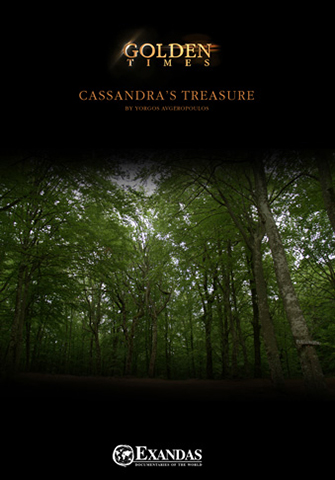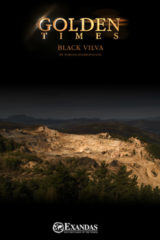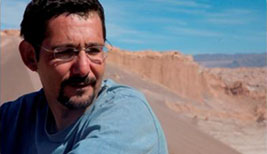
Golden Times – Cassandra’s Treasure
Dir: Yorgos AvgeropoulosThe exploitation of the country’s mineral wealth is projected as the most reasonable solution to deal with the economic crisis that plagues Greece. The Greek state has ceded its mining rights over 31.700 ha of land in northern Halkidiki, a region rich in gold, copper and other metals, to the Canadian multinational company Eldorado Gold. However, many of the region’s inhabitants, who have been resisting the construction of a goldmine for years, claim that this investment will cause irreparable damage to the environment and the benefits will be fewer than the losses.
“Cassandra’s Treasure” presents a detailed picture of the modern Greek state before and during the crisis period.
Watch the Film Now!
Choose the language you prefer and stream the film in Full HD from any digital device. Enjoy your private screening!
Buy the DVD
Public Screening
Are you interested in organizing a public screening of our film? Send us an email with your inquiry and we will be glad to assist you!
Educational / Library Use
Are you interested in enriching the library of your institution with our film? Contact us and let's create together an informed public!
- DURATION: 58min
- AVAILABLE IN THE FOLLOWING LANGUAGES: English | French | Greek
- AVAILABLE VERSIONS: English (58min) | French (58min) | Greek (58min)
- YEAR OF PRODUCTION: 2011
- Written & Directed by : Yorgos Avgeropoulos
- Producer: Georgia Anagnou
- Production Manager: Anastasia Skoubri
- Director of Photography: Yiannis Avgeropoulos, Theofilos Dadis
- Editing: Vasilis Magos, Anna Prokou
- Original Music: Yiannis Paxevanis
- Singing: Savina Yannatou
PRODUCTION NOTES
The forest of Skouries with its perennial beeches and oaks is one of the few remaining forests in Greece that has escaped from fires and predatory exploitation. This unapproachable and to many unknown forest is to be found on Mount Kakavos in northern Halkidiki, the land which gave birth to Aristotle, at the gates of Mount Athos.
“These forests are a point of reference for our country, considering they are in existence here since ancient times. They fall under the category of primordial forests, which are rare in the European realm, as well as globally”, says Theoharis Zagas, the President of the Hellenic Forestry Society, pointing out the forest’s great ecological value.
Indeed, this region’s peace may never have been disrupted, if an important gold and copper deposit worth 12 billion dollars did not exist underneath the trees’ roots. This is the reason why the mine in Skouries is the main point of focus of the investment plan of “Hellas Gold”, the joint venture responsible for the project’s execution. 95% of this company belongs to the Canadian Eldorado Gold and the remaining 5% belongs to the Greek construction company AKTOR, a member of the Bobolas Group.
In the heart of the forest, the company wants to build an opencast mine, as well as an underground one, in order to extract the gold deposit. The opencast mine will be 700 meters wide and 200 meters deep. The underground mine will have 25 kilometer-long galleries, which will reach a depth of 770 meters. They will also construct a processing plant and two tailing lakes.
The relevant environmental study has been approved by the Greek state and the deforestation process has already begun. However, the project is met with resistance by many inhabitants from the region, who have recourse to the Council of the State asking for the plan’s annulment.
Now, the forest has become a battlefield. It often vibrates with the protesters’ demonstrations and rallying slogans, voices which most of the times are met with violent crackdown and are drowned in tear gas by the police.
“THE FENCED IN FOREST REMINDS US OF AUSCHWITZ”
“All inhabitants have risen against the project and will not allow it to proceed. These people are not fighting for their daily labour, but because they want to save their land. They have no financial interests, but they only have in mind their children’s and this region’s future”, tells us Tolis Papageorgiou, a member of Hellenic Mining Watch, who has tied his life to the movement that fights against the mine’s construction.
It is not the first time that northern Halkidiki faces such investment plans. In the past during the 90’s, another Canadian company, TVX Gold, wanted to construct a goldmine in the area and once again the inhabitants, thanks to their dynamic resistance movement, had managed to thwart its plans. They had even declared the martial law in the region and imposed a curfew. Ultimately, the Council of the State decided in favour of the inhabitants by rescinding TVX Gold’s investment plan.
The company has walled in its facilities with barbed wires, cameras and alarm systems, which have even been placed on tree branches. The guardhouse is situated at a public road and the inhabitants claim that security guards dressed in black ask for their ID in order to let them pass. When they led us there, the security guards were filming us with their mobile phones. “In my fifty years of life, I don’t remember the forest ever being fenced in by a company. This reminds us of Auschwitz”, criticizes Demetres Kaltsos, who has been born and raised in this area.
“Have you ever thought that there are perhaps some people, who created these circumstances forcing me to do this? If that is the case, I will not apologize”, states Mr. Stratoudakis, the General Manager of Hellas Gold. “When in order to expand, you gather every upstart element in Greece, then it becomes a matter of sabotage. This is what caused problems for the police and this is why they, in turn, almost forced me to take such protection measures against certain things”.
31.700 ha IN EXCHANGE FOR 11.000.000 EURO
However, the Greek state has not only ceded its mining rights over the forest in Skouries. It has ceded its rights over 31.700 ha of land. These acres include two existing mines and their facilities, 310 houses in Stratoni, as well as the rights for research and expansion of the mining activity through the opening of new mines.
“The mining field in Halkidiki is perhaps one of the largest in the world”, confirms Mr. Stratoudakis, General Manager of Hellas Gold. “And in fact, it is wrongly oriented only towards gold mining. It is a polymetallic ore field. It contains copper, silver, gold, lead and zinc. It all lies next to us!”
The compensation which the company had to pay to the Greek state in order to acquire the above was a total of 11 million euro. “The greatest scandal that has ever taken place in Greece is not that of Siemens, nor that of Vatopedi. The greatest scandal in recent years is the transfer of this region to “Hellas Gold”. A matter which the Greek parliament should review”, says Mr. Lazaros Toskas, member of the committees fighting against these mines. “Mr. Pachtas gave away a mineral wealth worth billions, without receiving anything in return”.
THE TRANSACTION
For years now, Mr. Pachtas has abandoned the central political scene. He has returned to his land and is today mayor of the Aristotle Municipality, where they plan to build the mine. He is a man, who as Deputy Economy Minister gave away the mining field to Hellas Gold for 11.000.000 euro. It happened in December 2003. During a time, when (by all appearances) money existed and the country was undertaking major construction work because of the Olympic Games.
However, Halkidiki was in turmoil. The previous gold company, TVX Gold, had gone bankrupt and was leaving the country. At the mines hundreds of employees, who had not received any payment for months and were facing the danger of unemployment, had barricaded themselves in the galleries and were on hunger strike. On the other hand, their colleagues were vigorously protesting outside the Ministry of Finance at the center of Athens.
Mister Pachtas was desperately searching for a solution. “We squared the circle”, he remembers. “I knocked on every Greek businessman’s door that had a relation to the matter. No one wanted to risk their neck”. Ultimately, an investor was found. It was the company named Hellas Gold S.A., which had been established three days prior to the purchase by two seniors of the Greek construction company AKTOR of the Bobolas Group, one of the most important business groups in Greece. Soon, the investment scheme is constituted of AKTOR (35%) and the Canadian mining company European Goldfields (30%), as main shareholders.
The method in which they chose to transfer the mines to the possession of the new company was the following: The Greek state would buy the mines from TVX, which was leaving the country, for 11 million euro and at the same time, it would sell them to “Hellas Gold” at the same price. Neither a cent more, nor a cent less.
“We took it and we gave it to the other party as it was”, says Mr. Pachtas. “We did so, in order to keep the jobs and to keep the investment alive.” The 11 millions, which the Greek state received, did not end in its coffers. They were given as compensation to the workers of the company that was leaving.
“Do you know what Mr. Pachtas did for TVX? When 472 people lost their jobs, they were not compensated by TVX Gold, which wasn’t poor and had the obligation to do so. The ones who had to pay were you and I”, claims Tolis Papageorgiou from the Hellenic Mining Watch.
“The mineral wealth they sold was worth sixteen billions and they were given for free to a company that was founded, with a share capital of sixty thousand euro, the day before the transaction”, accuses Lazaros Toskas and points out: “Six months after the transaction, the mines’ worth was estimated to be 408 million euro!”
“What was their worth at that time? What was it? Do you remember?”, asks Mr. Pachtas intensely. “The company was bankrupt. Do you know how much a company that has declared bankruptcy is worth? How much is a bankrupt company worth? Zero. Is it worth anything more?”
“It was in fact a contract between two private parties. And for approximately one hour the Greek state was the mediator, so that we were ensured that we bought something specific, entailing certain responsibilities, but also that the Greek state would be able to ensure the investment’s continuation”, says Mr. Petros Stratoudakis, General Manager of “Hellas Gold”.
THE EUROPEAN COMMISSION ASKS FOR EXPLANATIONS
In 2008, the European Commission asked Greece for explanations. Mostly about the amount of the transaction and the method in which it took place, about the fact that the company “Hellas Gold” was exempted from paying transfer taxes and had to pay less for lawyers and notary fees.
Because the Greek answers were deemed inadequate, the European Commission reached the conclusion that the selling price of the Kassandra Mines to “Hellas Gold”, in 2003, was bellow its market value and that, as a result, the company received an illegal reinforcement of 15,3 million euro from the Greek state, thus breaching the EU’s rules. The Commission requested that the amount, plus the interest, be returned to the Greek state.
“And when the European Union requested from ‘Hellas Gold’ to return the fifteen and a half million euro to the Greek state, the Minister for Environment, Mr. Papakonstantinou, appealed to the European Court, so that the private investors would not have to pay the fifteen millions to the State”, says Mr. Toskas. “The scandals are so absurd that you can do nothing else but tear your hair out.”
“The Greek state invariably appeals against decisions by the European Commission, when it believes that it is not doing its job correctly”, replies Mr. Papakonstantinou. “The European Commission is not infallible. Many times it says things with which we disagree”. The hearing of the appeal is still pending.
“I am proud of the position we took in the matter!”, adds Mr. Pachtas. “Because of what we did at the time, life has good prospects today. I consider it a small matter, whether the State will receive five or ten millions more”.
“OUR HALKIDIKI WILL BECOME A LITTLE PARIS”
The Greek state is determined to protect “Hellas Gold’s” investment, which is presented as the greatest investment during this raging economic crisis.
However, it will not receive any mining rights, namely an amount of money from the wealth that will come from the earth’s bowels. Greece’s Mining Code, which was written during the military junta, contrary to other states in Europe and the world, does not make provisions for that.
Mister Papakonstantionu was asked how the country is profiting from this investment: “The State wins through taxation. In this case, over 1,000 people are going to be hired and those people will have incomes and thus pay taxes. There are insurance contributions and the State definitely is not gaining anything by not utilizing its deposits”.
“An investment or an enterprise creates productivity”, adds Mr. Pachtas. “In our case, it creates 1,500 – 1,600 new working positions, plus another 3,000 directly associated posts. So, we are talking about a total of 5,000 new working positions”, Mr. Pachtas points out. “Do you know what this means for the State funds? In which other region in Greece have 5,000 new working positions been created?”
The workers at the active mine of Stratoni, which also belongs to Hellas Gold, do not want to hear another doubting word from their countrymen about the investment. Gathered around a table during a break from their difficult work, they talk intensely and irritably.
“Which company hires people nowadays, in 2012? Halkidiki will become a little Paris. Everyone is dismissing people, our country is in pieces and we keep on harping on the same string?”, says an exasperated worker. “How can we move forward? Let us not be irrational! What does Greece have to offer, so that we can move forward? Don’t do this, don’t do that, so should we abandon our country?”, says another one.
“Does anyone understand that we want these jobs, but are not willing to sell out everything? We sell out our public property, our lives, our forests, everything. We never said that the existing mines should stop working, or that there shouldn’t be any working positions. But that cannot come about by selling everything out”, replies Lazaros Toskas.
THE ALTERNATIVE WAY OF SUSTAINABILITY
Yorgos Kalivas lives within the forest, as his parents and grandparents did in the past. He makes a living through hard working on his farm, where he has planted chestnut, walnut and cherry trees and keeps beehives… “I don’t harm nature, I peacefully coexist with it”, he tells us. “I am a piece of it and in this light we should all view ourselves. We should tread lightly and not heavily upon it”.
His house lies near the spot, where one of the mine’s tailing dams is to be built. However, he is determined not to abandon his land. “I should be the last to leave this place. Maybe I will be built into the dam’s concrete walls”, he admits to himself.
This forest used to be full of life. Families had their small gardens here and during the German occupation, the mountain saved a lot of people from hunger. Even now, many people live off the mountain. “All these people here are farmers, stock-breeders. Further down the mountain, you probably noticed a cheese factory. Do you imagine anyone buying cheese from here once the mine starts operating? Or that anyone will buy milk, meat, vegetables, mussels and fish coming from this area? Or do you think that any tourist is crazy enough to come here?”, says Tolis Papageorgiou. “There is an essential factor called sustainability. The ore has one particular attribute: you extract it once, you process it, you sell it and then it is gone. What remains are its tailings”.
“I believe it is worth to cumber 0,4% of a region in order to live. We cannot live only off plants and trees. There are hundreds of millions of trees to live off and luckily our region is one of the richest in Greece”, notes Mr. Pachtas. “Should we just leave the copper lying there? If, for example, the cables in our homes were made out of wood, wouldn’t we cut trees in order to transport electricity? Our case is not very different”, adds Mr. Stratoudakis of “Hellas Gold”.
CAN DEVELOPMENT EXIST WITHOUT THE ENVIRONMENT?
The inhabitants and the scientific bodies claim that the new mine and the region’s transformation into a heavy industrial zone will cause such destruction to the environment that no kind of gain will be able to compensate for it. They warn that the operations at the Skouries mine in Mount Kakavos will irreparably afflict this region’s water resources.
“From what I see, they propose drilling boreholes in order to lower the underground water level, so that they will be able to work. This will lower the underground water level to such an extent that there will be a water balance problem”, warns Mr. Karamouzis, professor of Hydraulic Engineering at AUTH. “The current situation will be thrown out of balance. The whole mountain will be drained and the water sources will be reduced”, he notes furthermore.
On the other hand, Mr. Pachtas and Mr. Stratoudakis of “Hellas Gold” emphasize that nothing of the sort will happen. “I was the first to say that I would stop the investment, if a single drop of water got lost. Especially in the case of the regions before Mount Athos, such as Uranopolis, Nea Roda, Ammouliani, Ierissos and Stratoni, which draw water from the same catchment area”, reassures the mayor, Mr. Pachtas.
Mister Papakonstantinou was the Minister for Environment, who in July 2011 and within 21 days of his assumption of office approved of the Environmental Impact Study, so that the company could proceed with its project. “The country has to decide on certain matters. Does it wish for development or not? Does it want to utilize its mineral wealth or not? If it does not, then we should state so and resign ourselves to doing nothing. However, we will be the only country in Europe, which has a great mineral wealth but does not undertake any action to utilize it”, he emphasizes.
Yorgos Kalivas, hidden at the heart of the forest, away from the Ministers’ offices, where decisions that threaten to change his life are made, stoically faces the current situation: “I believe that this is a postmodern war that is taking place here locally. It is an invasion using capital and the laws, in order to take away the raw materials and leave you with pollution and by-products”, he tells us. “As the ancient Greeks would say, this is hubris. There is no going back”.







